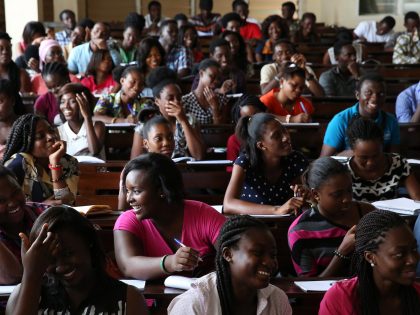
A brief history of five elections in Angola
The specter of Angola's 1992 elections continues to impact the country's democratic process.

The specter of Angola's 1992 elections continues to impact the country's democratic process.

This month, Africa's largest democracy and economy goes to the polls. On the AIAC podcast, we discuss Nigeria's upcoming elections.

Peru’s leftist president, Pedro Castillo, was impeached and arrested last month, triggering nation-wide protests. This week on the AIAC podcast we discuss what comes next for the divided nation.

The Nigerian presidential candidate’s claim of 'emi lokan' (it’s my turn) reveals complex ethnic politics and a stagnated democracy. Most responses to it, humor and rumor, reflect how Nigerians enact democratic citizenship.

Whether or not Twitter survives should be irrelevant to those committed to building a democratic public sphere.

Yoruba political ontology, non-competitive democracy, and the sacrality of power in Nigeria.

For philosophy to be relevant in Africa, it must democratize and address contemporary social problems.

The world has changed significantly since the 2008 financial crisis. But the roots of today’s disorder, stretch further back than we think. This week on the AIAC Podcast, we discuss.

After defying the state apparatus in March 2021, Senegalese voters sent a strong message of disobedience and sanction via their ballots in January 2022 and signaling their readiness for another regime change in 2024.

The leading political formations in Kenya's 2022 elections are born of each other, the result of many profound compromises, and this in part explains the blankness.

Voter apathy among young people in Kenya reveals fundamental flaws in Kenya’s democratic politics.

With the globe-spanning rise of right-wing populism, there may be good reason to fear for South Africa’s fledgling democracy.

The dissonance between what is communicated through local and international propaganda machines and what is actually taking place across the streets of Sudan.

In South Africa, the old endures and the new is nowhere to be seen. What is to be done? Public intellectual Steven Friedman helps us make sense.

Don’t get to excited by the local election results in South Africa. The party system is fragmenting, but old apartheid divides persist.

The Mo Ibrahim Prize rewards African presidents for promoting democracy. But there's no proof the prize has had any effect or that it is needed.

The best support that the Sudanese revolution can get from international allies is for them to reject and fight their own governments’ efforts to force a government of killers on Sudan for the second time.

Sudanese women took part in the revolution in large numbers for the same reasons they are now part of the resistance against this treacherous coup: Their human rights are at stake.

Instead of voting for the bankrupt ANC or DA, South Africans could do better with social movement candidates in upcoming local elections.

If re-municipalization—returning a privatized service to local public control—is to work in South Africa, we need other forms of social contracting between municipalities and citizens.